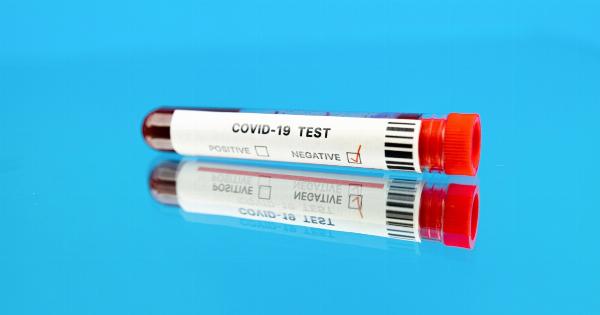The pregnancy test is a common tool used by women to determine if they are pregnant or not. It detects the presence of the hormone human chorionic gonadotropin (hCG) in the urine, which is produced during pregnancy.
However, recent research has suggested that the pregnancy test may also be a warning sign for testicular cancer in men. This surprising connection is raising awareness about the importance of regular self-examination and early detection for this potentially deadly disease.
Understanding Testicular Cancer
Testicular cancer is a relatively rare form of cancer that develops in the testicles. It primarily affects younger men between the ages of 15 and 44, with the average age of diagnosis being around 33 years.
The exact cause of testicular cancer is unknown, but certain risk factors have been identified, including undescended testicles, family history, and abnormal testicular development.
The most common symptom of testicular cancer is a painless lump or swelling in either testicle. Other symptoms may include a dull ache in the abdomen or groin, a feeling of heaviness in the scrotum, and changes in size or shape of the testicles.
While these symptoms can often be caused by non-cancerous conditions, it is crucial to seek medical attention if any abnormalities are detected.
The hCG Connection
Human chorionic gonadotropin (hCG) is a hormone typically associated with pregnancy, as it is produced by the placenta during early pregnancy. It is what pregnancy tests detect in a woman’s urine to determine if she is pregnant.
However, hCG can also be produced by certain types of testicular cancer, particularly those known as germ cell tumors.
The connection between hCG and testicular cancer was first noticed when a reddit user shared his story of taking a pregnancy test as a joke, only to receive a positive result. Intrigued, he consulted his doctor, who ordered further testing.
The tests eventually confirmed the presence of testicular cancer.
Studies have since found that certain types of testicular cancer, most notably choriocarcinoma and some rare forms of non-seminoma tumors, produce hCG.
This hormone can be detected not only in the blood but also in the urine, leading to positive results on a pregnancy test for affected individuals.
The Explained Mechanism
Testicular cancer is believed to originate from germ cells, which are responsible for sperm production. These cells can become cancerous and develop into tumors.
Choriocarcinoma, in particular, is an aggressive form of testicular cancer that originates from the cells that produce hCG during pregnancy.
When germ cells transform into cancer cells, they may begin to produce hCG, just like the placenta does during pregnancy. This hCG then enters the bloodstream and can be excreted in the urine.
When a man with testicular cancer takes a pregnancy test, the hCG in his urine reacts with the antibodies in the test, resulting in a positive result.
The Importance of Early Detection
Testicular cancer has one of the highest cure rates among all types of cancer if detected and treated early. In fact, the survival rate for men with localized testicular cancer is over 95%.
However, this rate drops significantly if the cancer has spread beyond the testicles. Regular self-examination is crucial for early detection and prompt treatment.
Self-examination involves checking the testicles for any abnormalities or signs of cancer. It is recommended to examine the testicles once a month using both hands, feeling for any lumps, swelling, or changes in size or shape.
Any concerns should be promptly reported to a healthcare professional for further evaluation.
In addition to self-examination, it is important for men to have regular check-ups with their healthcare provider. A doctor can perform a physical examination, order laboratory tests, and recommend further imaging studies if necessary.
The earlier testicular cancer is detected, the better the chances of successful treatment and a full recovery.
Other Uses for Pregnancy Tests
Aside from their connection to testicular cancer, pregnancy tests have also found alternative uses. Some individuals have resorted to taking pregnancy tests as a means of early detection for certain types of testicular cancer.
While a positive result may be indicative of a potential problem, it is crucial to consult a healthcare professional for proper diagnosis and further testing.
Pregnancy tests have also been used in unique situations where certain medications or medical conditions may cause false-positive results.
It is essential to note that pregnancy tests are not designed to detect cancer directly and should not be solely relied upon for diagnosing testicular cancer.
Raising Awareness
The surprising connection between the pregnancy test and testicular cancer has garnered significant attention and raised awareness about the importance of early detection.
Men are encouraged to familiarize themselves with the signs and symptoms of testicular cancer, perform regular self-examinations, and seek medical attention if any abnormalities are found.
Health organizations and medical professionals are working towards educating the public about this unique connection and the potential warning signs offered by a positive pregnancy test.
By spreading awareness, it is hoped that more individuals will be proactive about their health and seek timely medical intervention.
In Summary
While the main purpose of a pregnancy test is to detect pregnancy in women, its unexpected link to testicular cancer has brought about newfound awareness.
The hormone hCG, detected by pregnancy tests, can also be produced by certain types of testicular cancer. This connection highlights the importance of regular self-examinations, early detection, and timely medical intervention for the successful treatment of testicular cancer.





























